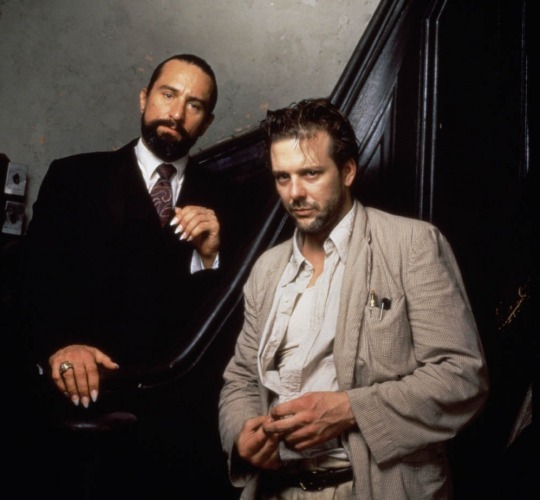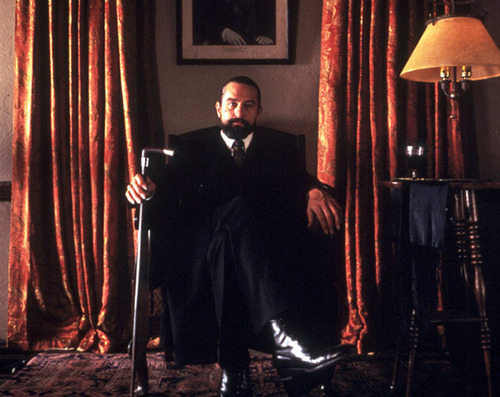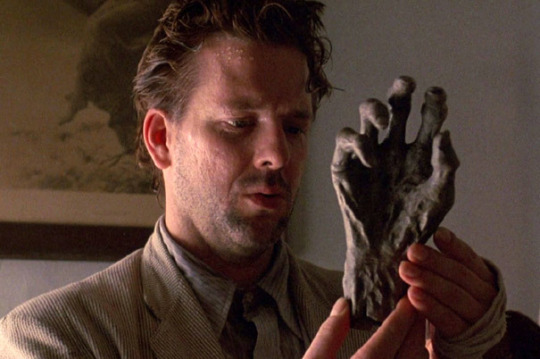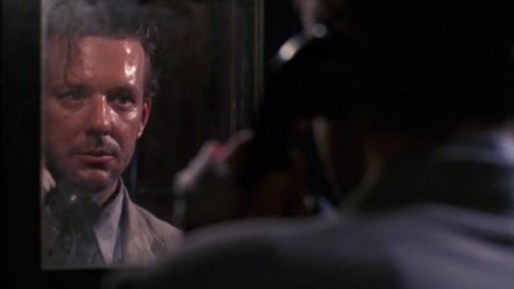Hell Noir: The Detective Fiction Horror of Alan Parker’s “Angel Heart” by Chris Evangelista
By Yasmina Tawil

Harry Angel is looking for himself; he just doesn’t know it. Angel, a private detective, tries to crack a blood-soaked case in Angel Heart, Alan Parker’s deft blending of mystery and horror. When it comes to crafting a detective story, Raymond Chandler, arguably the most well-known and well-versed scribbler of the pulp detective genre, created a series of “commandments” in the early 20th century that dictated ideal structure and characterization. These tenants, while not set in stone, continue to provide a strong framework for setting up the best kinds of pulp fiction.
Writer/director Parker, adapting his film from William Hjortsberg’s novel Falling Angel, employed Chandler’s rules to expertly summon up an accurate detective fiction-based universe that just happens to contain supernatural overtones. With Angel Heart, Parker takes the tried and true, noir-infused detective story and deftly combines it with Satanic-laced horror. The film breathes and bleeds with a naturalistic, time-capsule accuracy, whisking the viewer back to the late 1950s, when a private detective was not just expected but required to smoke too much, wear rumpled suits, and get in way over his head. By using Chandler’s rules as a framework to hang a horrific story, Angel Heart becomes a remarkable piece of detective fiction splashed onto the screen.
“[The detective] is the hero; he is everything. He must be a complete man and a common man and yet an unusual man…He must be the best man in his world and a good enough man for any world.” - Raymond Chandler
Harry Angel is the “complete…and yet unusual man” at the center of Angel Heart. If there is one aspect that the protagonist of Angel Heart does not share with Chandler’s ideal detective, it’s that when the truth is finally out in the open, Harry Angel is not a good man, for this or any world–although perhaps we shouldn’t blame Harry too much, as he truly doesn’t know who, and what, he really is. As played by Mickey Rourke, the private eye is a mess from the moment we see him inhabiting the wintry streets of New York. You can practically smell the cocktail of booze, sweat, and cigarette smoke coming off his untailored suits.
Angel has been summoned to Harlem by Herman Winesap (Dann Florek), of the law offices of Winesap and Macintosh – names that are also two kinds of apples, not so subtly calling up memories of Satan as a serpent in the Garden of Eden offering forbidden fruit. Angel meets Winesap at a church, where a pastor works his parishioners up into a religious fervor as he demands more money from them, claiming God wants him to drive a Cadillac; where a faceless washerwoman is scrubbing blood and gore from the room in which the building manager recently blew his brains out. If these weren’t enough bad omens to warn Angel not to take an impending case, meeting Winesap’s client should be.
Sitting in a large wooden chair as if perched on a throne, the client, Louis Cyphre, spins Angel a tale of a missing crooner named Johnny Favorite. Cyphre, played by Robert De Niro, oozes unsettling menace with every little tic and vocal inflection. Cyphre speaks softly when he speaks at all, often letting uncomfortable silences fill up the room as he gives Rourke’s character an icy stare. Decked out in a three-piece suit, De Niro makes Cyphre almost instantly iconic, even though he’s barely in the film twenty minutes. De Niro commands attention with very deliberate gestures and nuances, drawing viewers to him even without a showy, flashy performance.

Cyphre wants Angel to find the missing Johnny Favorite, who was believed to be in a mental institution for some time but has now vanished. Favorite has a contract with Cyphre, and you can guess what kind of contract someone might have with a man whose name sounds like “Lucifer” if said quickly. Already, writer/director Parker is leading us to the inevitable conclusion of the mystery: as Cyphre gives some details about Johnny Favorite – how the missing singer’s real name was Johnny Liebling, how he had become a popular crooner during the war – Rourke’s Harry Angel registers something familiar but unspoken: he knows something about all this, but he can’t quite put his finger on it. From the outset, Angel guides us through the detective story by fulfilling some parts of Chandler’s edict–being a common, relatable everyman–while eschewing any ideals of being a truly “good” person.
“[The story] must be realistic in character, setting and atmosphere. It must be about real people in a real world.” - Raymond Chandler
From here, Angel moves swiftly from one location to the next, trying to solve a mystery that he unknowingly doesn’t want to know the answer to. Parker filmed Angel Heart entirely on location, and his masterful recreation of ‘50s period details makes everything feel truly authentic–a feeling that embodies every frame of Angel Heart. Even though this is a film that dips into supernatural territory, Parker frames it all in a realistic way, giving audiences one of the most plausible stories ever created that just happens to feature the prince of darkness as a supporting character. It’s not just the places that sell it all: the props, the costumes, and the actors work harmoniously, recalling an era that seems unquestionably real even to those who never lived in it.
At one point, Angel strolls down the street and strikes up a brief conversation with a young female character who lives on the same street as Angel’s office. We never even see the young woman again, and she has no bearing on the story at all. But the easy-going nature of the mystery at hand, including the casual, even flirty way that Angel addresses her, takes on an almost documentary illusion: these people really live here, in this era, on this block, and have known each other for years. The rest of the film is peppered with characters like this: people who appear briefly for one scene, mostly in order to give Angel one more piece in his puzzle. These individuals – a flirtatious nurse, a dope-fiend doctor, an old married couple positioned beneath the shadows of the Wonder Wheel at Coney Island – never for one second seem like phony constructs or stock characters. Their performances, and the way Parker writes their attributed dialogue, all communicate a convincible verisimilitude. They all add as much realism as a film that features Satan as a character can possibly have.
“[Detective fiction] must have a sound story value apart from the mystery element: i.e., the investigation itself must be an adventure worth reading.” - Raymond Chandler
Despite amounting to little more than a series of scenes of Rourke’s character gathering info from strangers, the overall mystery and detective work of Angel Heart prove fluid and engrossing, adding up to more than the puzzle pieces of the mystery alone. The dark, occultish story Harry slowly pieces together about Johnny Favorite is compelling – a story filled with rituals, sacrifice, and demonic entities. Technically speaking, “Johnny Favorite” spends the entire movie off-screen, yet through Harry’s detective work we get a clear, ominous portrait of the man. We’re right there with Harry Angel every step of the way, waiting for him to solve the big mystery and escape the ominous forces swirling around him.

While Hjortsberg’s novel keeps all the action in New York, Parker wisely decides to send his protagonist down to Louisiana, where the humidity practically wafts off the screen. There, Harry meets Johnny Favorite’s illegitimate daughter Epiphany Proudfoot, played by Lisa Bonet. The two develop a sexual relationship, and, despite a clear age difference, there’s a tenderness between the couple that acts as a rare bit of levity in an otherwise death-drenched film. Meanwhile, Angel finds himself chased and besieged by mysterious characters trying to keep him away from his investigation, by rabid dogs, and by spooky omens that may or may not even be really there – the blood-scrubbing washerwoman he saw at the start of his journey, for instance, seems to follow him around from location to location like a phantom. While the solution to Harry’s case ends up being a whopper, it’s the investigation itself and the trouble it brings with it that really provides the thrills of Angel Heart. The living, breathing spookiness that permeates every scene provides the real glue here, ensuring that the film will be memorable for viewers long after the detective solves the case.
“It must not try to do everything at once. If it is a puzzle story operating in a rather cool, reasonable atmosphere, it cannot also be a violent adventure or a passionate romance.” - Raymond Chandler
What makes Angel Heart unique isn’t just its adherence to great detective fiction, but the wonderful fusion Parker creates of mystery and occultish horror. Although Chandler may not have wanted writers to “do everything at once” by combining several types of narratives, Parker more than ably blends tropes, creating both a strong mystery and a chilling horror story. Through it all, the witnesses Harry talks to – the ones who really have the dirt on what happened to Johnny – turn up brutally murdered. Johnny’s old fiancee Margaret Krusemark (Charlotte Rampling) gets her heart cut out. Krusemark’s father ends up drowned and burned in a big vat of gumbo after he spills the beans: Johnny Favorite was more than just a man with golden tonsils – he was a magician powerful enough to conjure up the devil and sell his soul, and then find a sacrificial ceremony to steal someone else’s life to cheat the devil of his due. Parker and cinematographer Michael Seresin make all of these elements subtly disturbing in ways we can’t quite put our finger on: a languidly spinning fan placed somewhere always signals an impending murder; the bodies found at murder scenes are suitably graphic and unnerving; Harry has those repeating visions of that washerwoman, along with a shot of a rickety downward-destined freight elevator with its gate sliding open to welcome him aboard; and Trevor Jones’ gloomy, heart-beat infused score saturates the film with tension, occasionally recalling a low tempo, slowed-down orchestral version of one of Johnny Favorite’s songs. Horror-laced menace occupies every frame of the film. By ignoring Chandler’s insistence on the separation of genres, Parker actually amplifies the effect of his narrative, providing both more realism and more of a mystery throughout the film.
“The solution must seem inevitable once revealed…[and the story] must punish the criminal in one way or another, not necessarily by operation of the law.” - Raymond Chandler
If you’re familiar with genre trappings, you’ll see the twist ending of Angel Heart coming a mile away: All the victims are bloodily silenced almost immediately after Harry meets with them, and while the conclusion is that Johnny Favorite is following Harry around and quickly bumping off the people the detective talks to, why would he wait until after they’ve already given Harry the dirt to kill them? Harry is the person closest to these people before their murders, and he’s the only one we ever see with them. On top of that, before every gruesome murder, where Harry extracts information from the soon-to-be-murdered cast of characters, the P.I. touches or at least glances at the forthcoming murder weapon. And yet this inevitability doesn’t tarnish the film’s shocking nature, nor does it negate anything that came before it. As Chandler knew, that’s how a good detective story works – you may solve the mystery before the protagonist, but when the truth is finally spoken out loud it will still satisfy. There’s no cheat here; we haven’t been fed deliberately false information to make the twist completely unforeseen.

Chandler believed in providing some sort of punishment for the the guilty party – be it by the law or by some cosmic karma. The awful solution to the mystery of Johnny Favorite and his Satanic doings stares both Harry Angel and the audience in the face the entire time, and just like Harry, we don’t want to believe it. How could we? Just as Raymond Chandler knew, we’re conditioned to think that the our private detective hero is always going to be a “good man.” Johnny Favorite serves as the antithesis of that – Epiphany says that her mother knew that deep down, Johnny Favorite was the most evil man she ever knew. With the twist in place, Harry Angel becomes both “the criminal” and the so-called “good enough man” Chandler thought should always be the lead character in a story like this. Subverting the idea of the heroic good man while undeniably creating a hero in Angel, Parker calls upon Chandler’s noir framework while also questioning the enduring effectiveness of its moral simplicity for today’s stories. The contemporary detective hero might not be defined as easily as a “good guy” as those of Chandler’s day–and maybe that’s what we need to see, in order to view him as a realistic common man. Angel tried to cheat the devil, after all. For that he’s going to burn, and since we as an audience were willing to put our faith in what we thought was our hero, Parker’s film suggests, we might have to burn with him.

